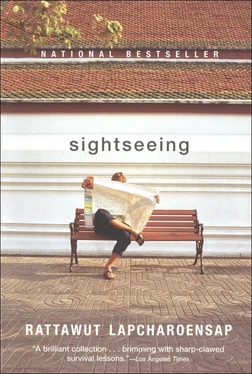Evening is upon us. The insects are out, moths fluttering against the pavilion lights. Many of the relatives have gone home with their sons to celebrate the miraculous appearance of a black card or, as is more often the case, to prepare their sons for the service in a week’s time. There are about a hundred of us left.
Wichu has moved to the front of the line.
The boy before Wichu draws a black card. He gives the finger to all the officers onstage and, in a loud booming voice that surprises us all, tells them to go fuck themselves. His parents and siblings jump up and down at the side of the pavilion, hugging one another, screaming with joy. Wichu’s mother is really nervous now. She leans against one of the rope-poles, her right leg jiggling wildly as if possessed, her mouth moving silently. Wichu Rattanaram, the speaker system says. Wichu gets up there and looks over the crowd. For a moment, I think he might be looking directly at me. In my head, I am thinking of a prayer. The officer spins the urn. I think I can hear the cards fluttering in there like so many birds. Black, black, black, I think. Wichu reaches into the urn, pulls out a card, hands it to the officer. Red, the speaker system says, and I can almost see Wichu’s shoulders slump from some invisible weight.
I look at Wichu’s mother. She is not jiggling her leg any longer, nor is she biting her nails. She merely stares out at Wichu, waves weakly to him. She seems calm. He walks off the stage to get his hair cut at the pagoda, that folder of useless documents still tucked under his arm.
The rest of the evening is like a dream to me now. I don’t remember much at all. I only remember Wichu arriving at the side of the pavilion to greet his mother with his head shaved. I only remember his mother reaching out to touch his scalp, to pull his head down into her bosom. He hands her his marching orders and she inspects it for a moment before tucking the document into the folder. The boys who’d been with me in the monks’ quarters start to go onstage then, the last of the year’s lottery. They pull out black card after black card after black card, like magicians pulling rabbits out of a hat. Nobody cheers for our black cards.
The sun has set, a light evening drizzle singing against the pavilion roof. Most of the relatives have gone home. Wichu’s mother, I see, has also gone home. But Wichu stays. He stands there and watches us pull out our black cards from the urn, a blank look on his face, his clean white shirt and crisp new slacks and buffed Bata loafers getting wet in the rain. He never looks at me. I want him to leave. After a while, I can’t look at him anymore.
They finally call my name. I walk onstage, though it seems they are calling somebody else. For the first time, that name doesn’t sound like my own. So I stand there for a moment before reaching into the urn to receive that generous fate which is mine and mine alone. And when I do, when I hand my black card to the officer and walk off the stage, I look toward the ropes and see that Wichu has finally gone on home without me.
We’re on the southbound train, the tracks swift beneath our feet, the windows rattling in their frames. The train crawls slowly down the archipelago, oceans bordering both sides of the tracks. To the east, the Hunan runoff softens the soil, silt spilling into the ocean, turning the Gulf of Thailand brown. Mountains shield the west from the monsoons, leaving the leeward coast barren and dry, the Andaman Sea retaining its crisp cool blue. We’re going through Prachuap Khiri Khan now, where the mountains recede briefly into a flattened plain, the seas pinching the peninsula into a needle. We are going through the slimmest part of the slimmest peninsula in the world, the Indian and the Pacific crashing against both shores. The earth is a tightrope; our train speeds across the flat thin wire. They say that a century from now this will all be gone, that the oceans will rise above this threadbare patch of earth, creating a strait as narrow as Molucca, as fine as Gibraltar, yoking the oceans, severing this nation in two. I can’t quite believe this because I never believe anything I won’t be around to see.
We’re going to Koh Lukmak, the last in a long chain of Andaman Islands, a tiny fortress of forest and stone. Ma’s boss had a picture of Lukmak on the office bulletin board for years and Ma said she wanted to see what all the fuss was about. The fine sand. The turquoise water. The millions of fishes swimming in the shallow. Her boss had called it paradise, and though I remember Ma telling me as a child that Thailand was only a paradise for fools and farangs, for criminals and foreigners, she’s willing to give it a chance now. If paradise is really out there, so close to home, she might as well go and see for herself.
It is not an easy trip — twelve hours by train, eight hours by boat — and Lukmak is so small it rarely appears on most maps. In a few hours, we will step off this train and sleep in Trang. We will leave that small seaboard town at daybreak, hire a boat at Tha Tien. The boat will be small and thin. With the monsoon’s approach in a few months’ time, our vessel will skip dangerously along the sea’s hard current. We will stop to rest and take lunch at Koh Trawen, the first of the Andaman Islands, an abandoned penal colony. We will leave Trawen after lunch, board the same small boat, get to Lukmak by nightfall.
Sightseeing, Ma said when we bought our tickets at the station in Bangkok. We’ll be farangs. We’ll be just like the tourists.
This is my last summer with Ma. At the end of the summer, I am to leave for a small vocational college up north.
I watch the blue of the Andaman on the right side of the train. Ma is turned the other way, watching the murky brown of the Gulf. Her window is open. She presses her face against the warm wind, her long black hair whipping wildly around her, the thin navy blue blouse fluttering against her chest. Our shoulders knock every so often, rocking to the motion of the train. We have barely spoken since we left Bangkok early this morning from Hua Lamphong Station.
I break the silence. I tell her to look straight ahead, toward the front of the car. I ask if she can see both oceans out of the corners of her eyes. She smiles and tells me she can. One eye blue, one eye brown. My mother puts a hand on my knee. Then we are silent again, eyes fixed on the front of the car. We know that soon the mountains will rise and we shall be committed to one side of the peninsula — blue or brown; that the sun shall set and the oceans will soon be dark and inhospitable; that the earth only thins and flattens out long enough for us to see two oceans at a single glance; that only a handful of people ever get to see this in their lifetime. Above all, Ma and I know that if things were different, if our lives were simply following their ordinary course, we would never have taken the time to notice such sights.
The beginnings seem so obvious now, though they did not present themselves so clearly to me then. False steps. Spilled coffee. Porcelain cups ratcheting against the kitchen counter.
Cuts and cooking burns, welts white against her dark arm. Bruises on her legs from running into furniture, ebony rosettes blooming on her unblemished skin. Shoulders knocking against doorframes. Her penciled eyebrows more arched than usual, uneven sometimes, the naked flesh of a brow peeking from beneath a thin charcoal line.
But I am at first too busy to give these things much thought. I am too absorbed with the life I plan to lead in the north, on my own, away from Ma. I spend nights in my room studying the vocational college’s pamphlets, its maps and course guide, brochures of the nearby town. I familiarize myself with the surrounding geography, dream of the mountains that nestle the campus, of a steady provincial peace away from Bangkok’s cacophony — its congestion, its heat, its concrete facades. I make copious lists of the belongings I will take with me. I revise this list endlessly. I pack and unpack into the night hours though my departure is still many months away.
Читать дальше











